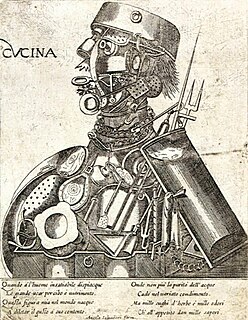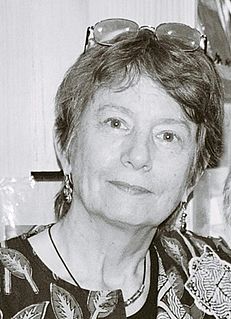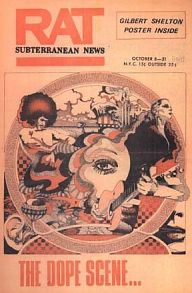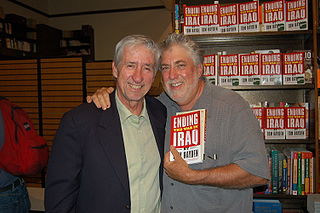Radical feminism is a perspective within feminism that calls for a radical reordering of society in which male supremacy is eliminated in all social and economic contexts.
Gender feminism is a term used by Christina Hoff Sommers and other writers to describe the feminist view of gender as socially constructed and distinct from biological sex. In her 1994 book Who Stole Feminism?, Sommers used the term gender feminist in contrast to equity feminist to refer to "radical" feminists who endorse the notion of patriarchy, i.e. male dominance reinforced through society's institutions.

SCUM Manifesto is a radical feminist manifesto by Valerie Solanas, published in 1967. It argues that men have ruined the world, and that it is up to women to fix it. To achieve this goal, it suggests the formation of SCUM, an organization dedicated to overthrowing society and eliminating the male sex. The Manifesto is widely regarded as satirical, but based on legitimate philosophical and social concerns. It has been reprinted at least 10 times in English, translated into 13 languages, and excerpted several times.

"A Cyborg Manifesto" is an essay written by Donna Haraway and published in 1985 in the Socialist Review. In it, the concept of the cyborg is a rejection of rigid boundaries, notably those separating "human" from "animal" and "human" from "machine". She writes: "The cyborg does not dream of community on the model of the organic family, this time without the oedipal project. The cyborg would not recognize the Garden of Eden; it is not made of mud and cannot dream of returning to dust."

Lesbian feminism is a cultural movement and critical perspective, most influential in the 1970s and early 1980s, that encourages women to direct their energies toward other women rather than men, and often advocates lesbianism as the logical result of feminism.

Transfeminism, also written trans feminism, has been defined by scholar and activist Emi Koyama as "a movement by and for trans women who view their liberation to be intrinsically linked to the liberation of all women and beyond." Koyama notes that it "is also open to other queers, intersex people, trans men, non-trans women, non-trans men and others who are sympathetic toward needs of trans women and consider their alliance with trans women to be essential for their own liberation." Transfeminism has also been defined more generally as "an approach to feminism that is informed by trans politics."

Marxist feminism is feminism focused on investigating and explaining the ways in which women are oppressed through systems of capitalism and private property. According to Marxist feminists, women's liberation can only be achieved through a radical restructuring of the current capitalist economy, in which, they contend, much of women's labor is uncompensated.
Socialist feminism rose in the 1960s and 1970s as an offshoot of the feminist movement and New Left that focuses upon the interconnectivity of the patriarchy and capitalism. Socialist feminists argue that liberation can only be achieved by working to end both the economic and cultural sources of women's oppression. Socialist feminism is a two-pronged theory that broadens Marxist feminism's argument for the role of capitalism in the oppression of women and radical feminism's theory of the role of gender and the patriarchy. Socialist feminists reject radical feminism's main claim that patriarchy is the only or primary source of oppression of women. Rather, socialist feminists assert that women are unable to be free due to their financial dependence on males. Women are subjects to the male rulers in capitalism due to an uneven balance in wealth. They see economic dependence as the driving force of women's subjugation to men. Further, socialist feminists see women's liberation as a necessary part of larger quest for social, economic and political justice. Socialist feminists attempted to integrate the fight for women's liberation with the struggle against other oppressive systems based on race, class or economic status.
Redstockings, also known as Redstockings of the Women's Liberation Movement, is a radical feminist group that was founded in January 1969 in New York City. The word is a portmanteau of bluestocking and red.

Cathlyn Platt Wilkerson, known as Cathy Wilkerson, is an American far-left radical who was a member of the 1970s radical group called the Weather Underground Organization (WUO). She came to the attention of the police when she was leaving the townhouse belonging to her father after it was destroyed by an explosion on March 6, 1970. Members of WUO had been constructing a nail bomb in the basement of the building, intending to use it in an attack on a non-commissioned officers dance at Fort Dix, New Jersey that night. Wilkerson, already free on bail for her involvement in the Chicago "Days of Rage" riots, avoided capture for 10 years. She surrendered in 1980 and pleaded guilty to unlawful possession of dynamite. She was sentenced to up to three years in prison and served 11 months.

Laura Jane Whitehorn is a convicted domestic terrorist and political activist. Whitehorn was born in Brooklyn, New York to Lenore and Nathaniel Whitehorn. As a college student in the 1960s, she organized and participated in civil rights and anti-war movements. After her graduation from Radcliffe College in 1966, she went on to receive her master's from Brandeis University. She participated in the 1983 United States Senate bombing and served 14 years in federal prison for her crimes.
Naomi Esther Jaffe is a former undergraduate student of Herbert Marcuse and member of the Weather Underground Organization. Jaffe was recently the Executive Director of Holding Our Own, a multiracial foundation for women.
Initially called "The Proud Eagle Tribe," the communiqué from the Women's Brigade of the Weather Underground pledged to "build a militant women's movement that commits itself to the destruction of Amerikan imperialism" and exploit "the man's chauvinism" as a "strategic weakness."
A variety of movements of feminist ideology have developed over the years. They vary in goals, strategies, and affiliations. They often overlap, and some feminists identify themselves with several branches of feminist thought.
Feminist views on transgender topics vary wildly. Early feminist views on trans people were often hostile, but views of modern feminists tend to be more positive. The National Organization for Women supports trans rights, as does the Feminist Majority Foundation.
Feminist views on sexuality widely vary. Many feminists, particularly radical feminists, are highly critical of what they see as sexual objectification and sexual exploitation in the media and society. Radical feminists are often opposed to the sex industry, including opposition to prostitution and pornography. Other feminists define themselves as sex-positive feminists and believe that a wide variety of expressions of female sexuality can be empowering to women when they are freely chosen. Some feminists support efforts to reform the sex industry to become less sexist, such as the feminist pornography movement.

Woman's rights is characterized as "the regulation supporting social, political, and every single other right of ladies equivalent to those of men". Women's activists go over an assortment of sexual orientations, races, ethnic foundations, and religions. Consistently, women's activists have utilized a wide assortment of media to spread their messages. This media incorporates however isn't restricted to daily paper, writing, radio communicates, TV, online networking, and web. Without media to circulate their thoughts, woman's rights developments would not have been conceivable and could have surrendered to potential misfortunes.













